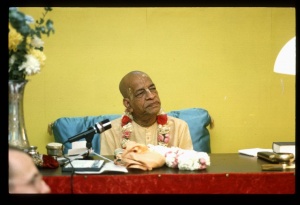SB 4.1.6

A.C. Bhaktivedanta Swami Prabhupada
TEXT 6
- tāṁ kāmayānāṁ bhagavān
- uvāha yajuṣāṁ patiḥ
- tuṣṭāyāṁ toṣam āpanno
- 'janayad dvādaśātmajān
SYNONYMS
tām—her; kāmayānām—desiring; bhagavān—the Lord; uvāha—married; yajuṣām—of all sacrifices; patiḥ—master; tuṣṭāyām—in His wife, who was very much pleased; toṣam—great pleasure; āpannaḥ—having obtained; ajanayat—gave birth; dvādaśa—twelve; ātmajān—sons.
TRANSLATION
The Lord of the ritualistic performance of yajña later married Dakṣiṇā, who was anxious to have the Personality of Godhead as her husband, and in this wife the Lord was also very much pleased to beget twelve children.
PURPORT
An ideal husband and wife are generally called Lakṣmī-Nārāyaṇa to compare them to the Lord and the goddess of fortune, for it is significant that Lakṣmī-Nārāyaṇa are forever happy as husband and wife. A wife should always remain satisfied with her husband, and a husband should always remain satisfied with his wife. In the Cāṇakya-śloka, the moral instructions of Cāṇakya Paṇḍita, it is said that if a husband and wife are always satisfied with one another, then the goddess of fortune automatically comes. In other words, where there is no disagreement between husband and wife, all material opulence is present, and good children are born. Generally, according to Vedic civilization, the wife is trained to be satisfied in all conditions, and the husband, according to Vedic instruction, is required to please the wife with sufficient food, ornaments and clothing. Then, if they are satisfied with their mutual dealings, good children are born. In this way the entire world can become peaceful, but unfortunately in this age of Kali there are no ideal husbands and wives; therefore unwanted children are produced, and there is no peace and prosperity in the present-day world.